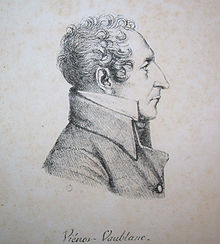Vincent-Marie Viénot de Vaublanc
Vincent-Marie Viénot de Vaublanc , called Comte de Vaublanc (born March 2, 1756 in Fort-Dauphin, today Fort-Liberté , Haiti , † August 21, 1845 in Paris ) was a French statesman .
Life
Vincent-Marie Viénot de Vaublanc came from a wealthy noble family in Burgundy. He was born in the French colony of Saint-Domingue , where his father was stationed as an officer and in command of Fort-Dauphin . He came to France at the age of seven. He graduated from the cadet school in La Flèche and completed a military career . 1782 Vaublanc bought the office of a judge ( Lieutenant des maréchaux de France ) and an estate in Dammarie-les-Lys near Melun and settled there.
In 1789 Vaublanc became secretary of the nobility assembly in the Bailliage Melun. After the establishment of the departments in 1790, he was appointed President of the Seine-et-Marne department. In September 1791 Vaublanc was elected to the French National Assembly and shortly afterwards elected by the royalist majority as President of Parliament. During the reign of terror , he hid in various places in southwest France and did not return to Paris until 1795, after Robespierre's death . When he was threatened with death again during the administration of the Directory , he emigrated to Switzerland and Italy.
After the coup d'état of 18th Brumaire VIII , he returned to France. Under Napoleon Bonaparte , Vaublanc was briefly president of the Corps législatif in 1803 and prefect of the Moselle department from 1805 to 1814 . After the fall of Napoleon he retained this office, but had during the Hundred Days from Metz to flee after he and Nicolas Oudinot had tried not to let the city fall into the hands of the Imperialists.
After the second return of Louis XVIII. In December 1815, he appointed Vaublanc as a Grand Officer of the Legion of Honor in gratitude for his support . During the Restoration , Vaublanc became one of the most ardent advocates of ultra-royalist politics in the Chambre introuvable . In the years 1815 and 1816 Vaublanc officiated at the instigation of the Comte d'Artois in the Ministry of Richelieu as Minister of the Interior. After the failure of his plan to change the French electoral law, he submitted his resignation in May 1816.
Between 1820 and 1827 Vaublanc returned to the political stage as a deputy of the Calvados department and was appointed to the Conseiller d'État in 1830 . In the same year he said goodbye to politics on the occasion of King Louis Philippe's accession to the throne .
In his main work Mémoires sur la Révolution de France , published in 1833, he developed his own theory about the reasons for the outbreak of the French Revolution .
Works (selection)
- Rapport sur les honneurs et récompenses militaires, le 28 janvier 1792, fait à l'Assemblée nationale, au nom du Comité d'instruction publique (1792), available online via Gallica , the digitization project of the French National Library
- Réflexions sur les bases d'une constitution (1795), under the pseudonym “L.-P. de Segur ”.
- Considérations critiques sur la nouvelle ère, sous la forme d'un discours à la tribune du Conseil des Cinq-Cens (1801), available online from Gallica and available as a microfiche edition (Witney 1993) in the series “The French Revolution research collection "
- Des administrations provinciales et municipales (1828), available online from Gallica.
- Mémoires sur la Révolution de France et recherches sur les causes qui ont amené la Révolution de 1789 et celles qui l'ont suivie (4 volumes, 1833), available online from Gallica: Volume 1 , Volume 3 and Volume 4
- Souvenirs (2 volumes, 1839)
Web links
- Photo and description of the plaster bust of Vaublanc created around 1820 by the French sculptor Charles Mercier Dupaty (1771–1825) on the website of the Dahesh Museum of Art , New York.
Remarks
- ↑ Guillaume de Bertier de Sauvigny, Bibliography critique des mémoires sur la Restauration écrits ou traduits en français, Librairie Droz, 1988, p. 251.
- ↑ Benoît Yvert and Emmanuel de Waresquiel smugly comment on this: "Son" dévouement à perdre haleine "[...] ne suffit pas, contrairement à ce qu'il croit, pour dominer une chambre dans laquelle la moindre de ses interventions provoque un fou rire généralisé ". Emmanuel de Waresquiel, Benoît Yvert: Histoire de la Restoration 1814-1830. Naissance de la France moderne , Paris 1996, p. 179.
- ↑ On Vaublanc's role during the restoration cf. Rudolf von Thadden : Restoration and Napoleonic Legacy. Administrative centralism as a political problem in France (1814–1830) . Steiner, Wiesbaden 1972, pp. 105-107.
| predecessor | Office | successor |
|---|---|---|
| Pierre-Victurnien Vergniaud |
President of the Legislative Assembly of France November 28, 1791-10. December 1791 |
Bernard Germain Lacépède |
| Étienne-Denis Pasquier |
Minister of the Interior of France September 26, 1815–7. May 1816 |
Joseph Henri Joachim Lainé |
| personal data | |
|---|---|
| SURNAME | Viénot de Vaublanc, Vincent-Marie |
| ALTERNATIVE NAMES | Vaublanc, Vincent-Marie Viénot Comte de (full name) |
| BRIEF DESCRIPTION | French statesman |
| DATE OF BIRTH | March 2, 1756 |
| PLACE OF BIRTH | Fort-Dauphin, Saint-Domingue, today Fort-Liberté , Haiti |
| DATE OF DEATH | August 21, 1845 |
| Place of death | Paris |
